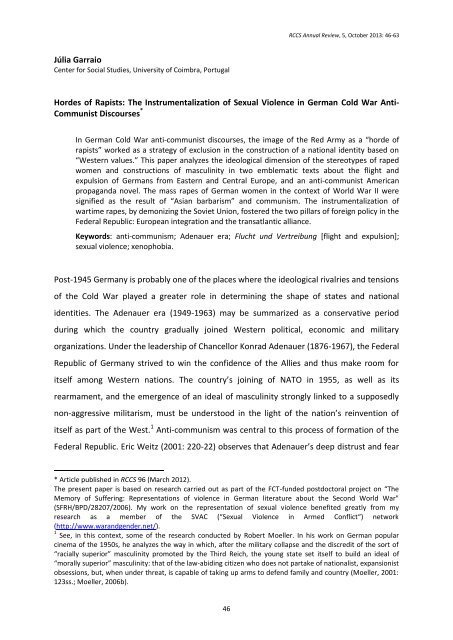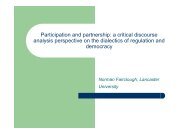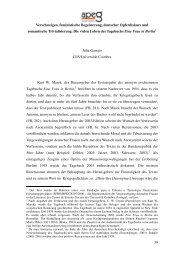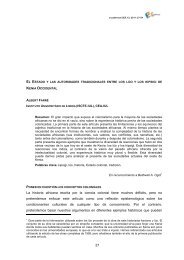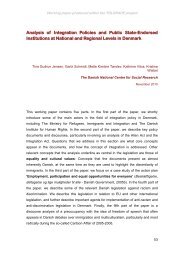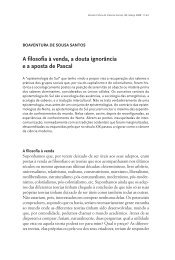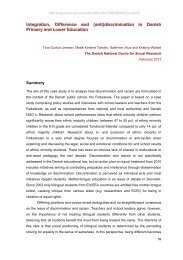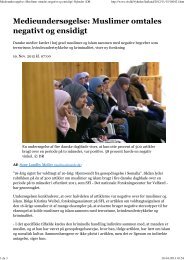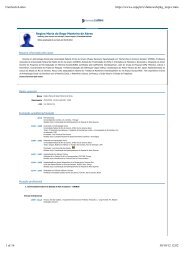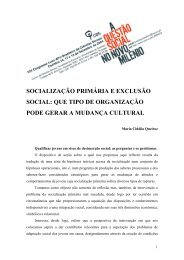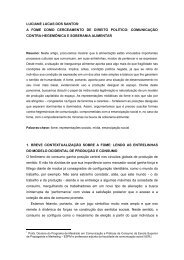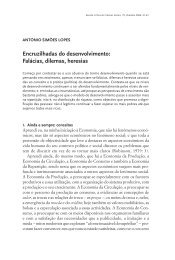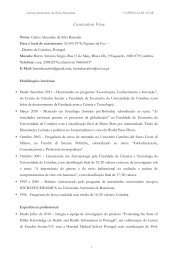The Instrumentalization of Sexual Violence in German Cold War Anti ...
The Instrumentalization of Sexual Violence in German Cold War Anti ...
The Instrumentalization of Sexual Violence in German Cold War Anti ...
You also want an ePaper? Increase the reach of your titles
YUMPU automatically turns print PDFs into web optimized ePapers that Google loves.
RCCS Annual Review, 5, October 2013: 46-63<br />
Júlia Garraio<br />
Center for Social Studies, University <strong>of</strong> Coimbra, Portugal<br />
Hordes <strong>of</strong> Rapists: <strong>The</strong> <strong>Instrumentalization</strong> <strong>of</strong> <strong>Sexual</strong> <strong>Violence</strong> <strong>in</strong> <strong>German</strong> <strong>Cold</strong> <strong>War</strong> <strong>Anti</strong>-<br />
Communist Discourses *<br />
In <strong>German</strong> <strong>Cold</strong> <strong>War</strong> anti-communist discourses, the image <strong>of</strong> the Red Army as a “horde <strong>of</strong><br />
rapists” worked as a strategy <strong>of</strong> exclusion <strong>in</strong> the construction <strong>of</strong> a national identity based on<br />
“Western values.” This paper analyzes the ideological dimension <strong>of</strong> the stereotypes <strong>of</strong> raped<br />
women and constructions <strong>of</strong> mascul<strong>in</strong>ity <strong>in</strong> two emblematic texts about the flight and<br />
expulsion <strong>of</strong> <strong>German</strong>s from Eastern and Central Europe, and an anti-communist American<br />
propaganda novel. <strong>The</strong> mass rapes <strong>of</strong> <strong>German</strong> women <strong>in</strong> the context <strong>of</strong> World <strong>War</strong> II were<br />
signified as the result <strong>of</strong> “Asian barbarism” and communism. <strong>The</strong> <strong>in</strong>strumentalization <strong>of</strong><br />
wartime rapes, by demoniz<strong>in</strong>g the Soviet Union, fostered the two pillars <strong>of</strong> foreign policy <strong>in</strong> the<br />
Federal Republic: European <strong>in</strong>tegration and the transatlantic alliance.<br />
Keywords: anti-communism; Adenauer era; Flucht und Vertreibung [flight and expulsion];<br />
sexual violence; xenophobia.<br />
Post-1945 <strong>German</strong>y is probably one <strong>of</strong> the places where the ideological rivalries and tensions<br />
<strong>of</strong> the <strong>Cold</strong> <strong>War</strong> played a greater role <strong>in</strong> determ<strong>in</strong><strong>in</strong>g the shape <strong>of</strong> states and national<br />
identities. <strong>The</strong> Adenauer era (1949-1963) may be summarized as a conservative period<br />
dur<strong>in</strong>g which the country gradually jo<strong>in</strong>ed Western political, economic and military<br />
organizations. Under the leadership <strong>of</strong> Chancellor Konrad Adenauer (1876-1967), the Federal<br />
Republic <strong>of</strong> <strong>German</strong>y strived to w<strong>in</strong> the confidence <strong>of</strong> the Allies and thus make room for<br />
itself among Western nations. <strong>The</strong> country’s jo<strong>in</strong><strong>in</strong>g <strong>of</strong> NATO <strong>in</strong> 1955, as well as its<br />
rearmament, and the emergence <strong>of</strong> an ideal <strong>of</strong> mascul<strong>in</strong>ity strongly l<strong>in</strong>ked to a supposedly<br />
non-aggressive militarism, must be understood <strong>in</strong> the light <strong>of</strong> the nation’s re<strong>in</strong>vention <strong>of</strong><br />
itself as part <strong>of</strong> the West. 1 <strong>Anti</strong>-communism was central to this process <strong>of</strong> formation <strong>of</strong> the<br />
Federal Republic. Eric Weitz (2001: 220-22) observes that Adenauer’s deep distrust and fear<br />
* Article published <strong>in</strong> RCCS 96 (March 2012).<br />
<strong>The</strong> present paper is based on research carried out as part <strong>of</strong> the FCT-funded postdoctoral project on “<strong>The</strong><br />
Memory <strong>of</strong> Suffer<strong>in</strong>g: Representations <strong>of</strong> violence <strong>in</strong> <strong>German</strong> literature about the Second World <strong>War</strong>"<br />
(SFRH/BPD/28207/2006). My work on the representation <strong>of</strong> sexual violence benefited greatly from my<br />
research as a member <strong>of</strong> the SVAC (“<strong>Sexual</strong> <strong>Violence</strong> <strong>in</strong> Armed Conflict“) network<br />
(http://www.warandgender.net/).<br />
1 See, <strong>in</strong> this context, some <strong>of</strong> the research conducted by Robert Moeller. In his work on <strong>German</strong> popular<br />
c<strong>in</strong>ema <strong>of</strong> the 1950s, he analyzes the way <strong>in</strong> which, after the military collapse and the discredit <strong>of</strong> the sort <strong>of</strong><br />
“racially superior” mascul<strong>in</strong>ity promoted by the Third Reich, the young state set itself to build an ideal <strong>of</strong><br />
“morally superior” mascul<strong>in</strong>ity: that <strong>of</strong> the law-abid<strong>in</strong>g citizen who does not partake <strong>of</strong> nationalist, expansionist<br />
obsessions, but, when under threat, is capable <strong>of</strong> tak<strong>in</strong>g up arms to defend family and country (Moeller, 2001:<br />
123ss.; Moeller, 2006b).<br />
46


